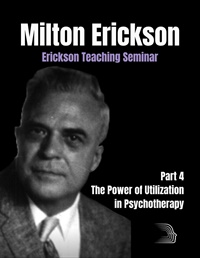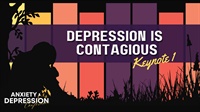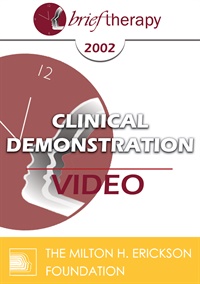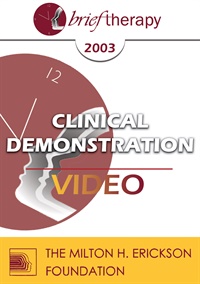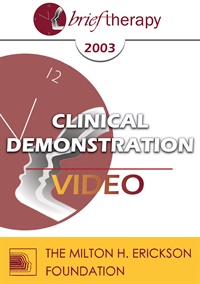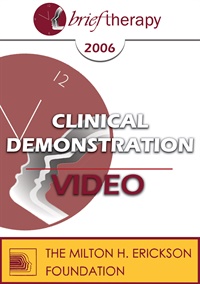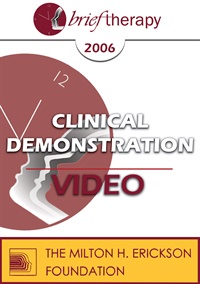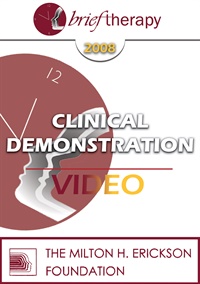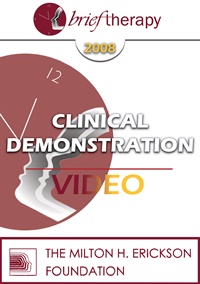- Average Rating:
- Not yet rated
- Topic Areas:
- Milton Erickson | Utilization | Ericksonian Psychotherapy | Psychotherapy | Ericksonian Hypnosis and Therapy Techniques | Hypnosis
- Categories:
- Erickson Materials | Erickson Streaming Video Collection | Milton H. Erickson Collections
- Faculty:
- Jeffrey Zeig, PhD | Milton H. Erickson, MD
- Course Levels:
- Master Degree or Higher in Health-Related Field
- Duration:
- 1 hour
- Format:
- Audio and Video
- Original Program Date:
- Jul 22, 2020
- Short Description:
- Join Milton Erickson at his teaching seminar in the late 1970s. You will encounter his innovative teaching methods prompting students to activate their utilization skills. Learn Erickson's process for creating memorable interventions with clients overly concerned about body image. Encounter his method of using nonverbal methods to evoke adaptive responses. Introduction and annotations by Jeff Zeig, Erickson Foundation Director.
- Price:
- $29.95 - Base Price
- Average Rating:
- Not yet rated
- Topic Areas:
- Keynotes | Cognitive Psychology | Depression | Hypnosis
- Categories:
- Anxiety and Depression Conference 2024
- Faculty:
- Michael Yapko, PhD
- Course Levels:
- Master Degree or Higher in Health-Related Field
- Duration:
- 1:03:13
- Format:
- Audio and Video
- Original Program Date:
- Sep 14, 2024
- Short Description:
- This session reframes depression as a socially transmitted condition rather than simply a biochemical disorder. Yapko reviews research on medication limits, placebo effects, and the impact of factors like social media, COVID, and cognitive style. Participants learn how critical thinking, resilience skills, and experiential methods like hypnosis can help clients move beyond passive treatments toward active recovery.
- Price:
- $59.00 - Base Price
- Average Rating:
- Not yet rated
- Topic Areas:
- Workshops | Depression | Experiential Therapy | Hypnosis
- Categories:
- Anxiety and Depression Conference 2024
- Faculty:
- Michael Yapko, PhD
- Course Levels:
- Master Degree or Higher in Health-Related Field
- Duration:
- 1:55:45
- Format:
- Audio and Video
- Original Program Date:
- Sep 14, 2024
- Short Description:
- This workshop illustrates how hypnosis empowers depressed clients by teaching skills rather than prescribing labels or pills. Yapko shows how trance fosters expectancy, resilience, and self-discovery, offering a powerful antidote to rumination and helplessness. Participants learn how hypnosis provides a flexible, experiential context for change, helping clients reframe their history and embrace new possibilities.
- Price:
- $59.00 - Base Price
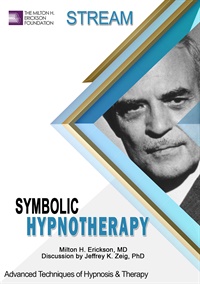
Credit available - Click Here for more information
- Average Rating:
- Not yet rated
- Topic Areas:
- Hypnosis | Advanced Techniques of Hypnosis & Therapy | Continuing Education | Ericksonian Hypnosis and Therapy Techniques | Hypnotherapy | Milton Erickson | Communication | Metaphors
- Categories:
- Advanced Techniques of Hypnosis & Therapy | Featured | Training Videos | Online Continuing Education | Milton H. Erickson Collections
- Faculty:
- Jeffrey Zeig, PhD | Milton H. Erickson, MD
- Course Levels:
- Master Degree or Higher in Health-Related Field
- Duration:
- 02:38:00
- Format:
- Audio and Video
- Original Program Date:
- Dec 31, 1977
- Short Description:
- This training tool contains segments of hypnotherapy conducted by Erickson, with the same subject, on two consecutive days in 1978. Erickson demonstrates how symbols may be used as metaphoric forms of communication to foster new ideas and understandings. Zeig discusses Erickson’s technique.
- Price:
- $75.00 - Base Price
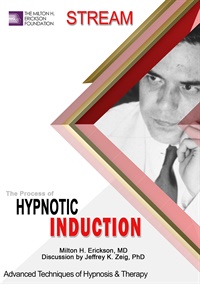
Credit available - Click Here for more information
- Average Rating:
- Not yet rated
- Topic Areas:
- Hypnosis | Hypnotic Induction | Advanced Techniques of Hypnosis & Therapy | Continuing Education | Ericksonian Hypnosis and Therapy Techniques | Milton Erickson
- Categories:
- Advanced Techniques of Hypnosis & Therapy | Featured | Training Videos | Online Continuing Education | Milton H. Erickson Collections
- Faculty:
- Milton H. Erickson, MD | Jeffrey Zeig, PhD
- Course Levels:
- Master Degree or Higher in Health-Related Field
- Duration:
- 01:54:00
- Format:
- Audio and Video
- Original Program Date:
- Dec 31, 1963
- Short Description:
- The Process of Hypnotic Induction features Erickson in 1964, working with several different subjects. He demonstrates how to individualize the method of induction to fit the unique characteristics of the individual. Jeffrey Zeig discusses the microdynamics of technique that Erickson used in his 1964 inductions. Comments are aimed at clinicians experienced in hypnosis looking to refine their skills.
- Price:
- $75.00 - Base Price
- Average Rating:
- Not yet rated
- Topic Areas:
- Hypnosis | Advanced Techniques of Hypnosis & Therapy | Ericksonian Hypnosis and Therapy Techniques | Marriage | Milton Erickson | Seeding | Utilization
- Categories:
- Advanced Techniques of Hypnosis & Therapy | Training | Milton H. Erickson Collections | World Languages | German
- Faculty:
- Milton H. Erickson, MD | Jeffrey Zeig, PhD
- Course Levels:
- Master Degree or Higher in Health-Related Field
- Duration:
- 2 Hours 24 Min
- Format:
- Audio and Video
- Original Program Date:
- Dec 31, 1977
- Short Description:
- This hypnotherapeutic session took place in 1978, and decades later, it’s just as powerful and engaging. Enhancing the viewer’s learning experience is Dr. Zeig’s discussion of the underlying elements of Erickson’s methods: the ARE model of instruction; the art of parallel communication; targeted utilization; and the use of implication. Erickson’s fluid repertoire, drawn from systematic thinking, includes the use of anecdotes, symbolic communication, and strategic seeding. The elicitation of solutions, based on promoting constructive associations and flexible thoughts and feelings, is an area of particular interest and one in which Erickson was especially elegant.
- Price:
- $65.00 - Base Price

- Average Rating:
- Not yet rated
- Topic Areas:
- Advanced Techniques of Hypnosis & Therapy | Ericksonian Hypnosis and Therapy Techniques | Hypnosis | Milton Erickson | Psychotherapy | Resistance
- Bundle(s):
- Spanish Erickson Video Bundle
- Categories:
- Spanish | Advanced Techniques of Hypnosis & Therapy | Milton H. Erickson Collections | World Languages
- Faculty:
- Milton H. Erickson, MD | Jeffrey Zeig, PhD
- Course Levels:
- Master Degree or Higher in Health-Related Field
- Duration:
- 1 Hour 55 Minutes
- Format:
- Audio and Video
- Original Program Date:
- Dec 31, 1978
- Short Description:
- El Dr. Zeig introduce original de 1979 metraje y revela patrones del Dr. Erickson con entendimientos limpiados de discusión con el propio Dr. Erickson
- Price:
- $75.00 - Base Price
Credit available - Click Here for more information
- Average Rating:
- Not yet rated
- Topic Areas:
- Hypnosis | Psychotherapy | Advanced Techniques of Hypnosis & Therapy | Continuing Education | Resistance | Ericksonian Hypnosis and Therapy Techniques | Milton Erickson | Confusion Technique | Naturalistic | Seeding | Hypnotherapy
- Categories:
- Advanced Techniques of Hypnosis & Therapy | Featured | Training Videos | Online Continuing Education | Milton H. Erickson Collections
- Faculty:
- Milton H. Erickson, MD | Jeffrey Zeig, PhD
- Course Levels:
- Master Degree or Higher in Health-Related Field
- Duration:
- 1 Hour 55 Min
- Format:
- Audio and Video
- Original Program Date:
- Dec 31, 1978
- Short Description:
- In 1979, Milton Erickson and Jeffrey Zeig spent five hours reviewing a demonstration that Erickson conducted at a teaching seminar. That demonstration is now available as a training video for Ericksonian practitioners. Erickson’s experiential methods include the symbolic use of hypnotic phenomena, encouraging resistance, naturalistic confusion technique, seeding, and using isomorphic anecdotes. Jeffrey Zeig discusses the mechanics of Erickson’s unique approach to psychotherapy. Working with Resistance provides an opportunity to watch a master hypnotherapist demonstrate his technique.
- Price:
- $75.00 - Base Price
- Average Rating:
- Not yet rated
- Topic Areas:
- Clinical Demonstrations | Hypnosis | Art and Creativity | Brief Therapy | Four-Stage Creative Process | Genomics | Group Induction | Hypnotic Induction
- Categories:
- Brief Therapy Conference | Brief Therapy Conference 2002
- Faculty:
- Ernest Rossi, PhD
- Course Levels:
- Master Degree or Higher in Health-Related Field
- Duration:
- 55:29
- Format:
- Audio and Video
- Original Program Date:
- Dec 13, 2002
- Short Description:
- Educational Objectives: 1) To describe the group induction of therapeutic hypnosis with ideodynamic methods. 2) To list the four stages of the creative process in therapeutic hypnosis.
- Price:
-
Sale is $29.00
price reduced from Base Price - $59.00
- Average Rating:
- Not yet rated
- Topic Areas:
- Clinical Demonstrations | Hypnosis | Brief Therapy | Goals of the Therapist | Experiential Therapy
- Categories:
- Brief Therapy Conference | Brief Therapy Conference 2002
- Faculty:
- Michael Yapko, PhD
- Course Levels:
- Master Degree or Higher in Health-Related Field
- Duration:
- 57:16
- Format:
- Audio and Video
- Original Program Date:
- Dec 13, 2002
- Short Description:
- In this demonstration, Michael Yapko works with a volunteer struggling with anxiety and self-doubt in piano playing. Using hypnosis, he helps her shift from perfectionistic fears and past failures toward experiencing learning as an ongoing process. Participants see how trance can reinforce strengths, reframe setbacks, and support steady progress by opening access to inner resources.
- Price:
-
Sale is $29.00
price reduced from Base Price - $59.00
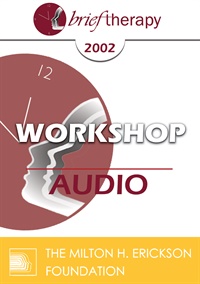
- Average Rating:
- Not yet rated
- Topic Areas:
- Workshops | Cognitive Behavior Therapy (CBT) | Depression | Hypnosis
- Categories:
- Brief Therapy Conference | Brief Therapy Conference 2002
- Faculty:
- Michael Yapko, PhD
- Duration:
- 2:32:28
- Format:
- Audio Only
- Original Program Date:
- Dec 12, 2002
- Short Description:
- In this workshop, Yapko demonstrates how hypnosis can enrich CBT for depression by building expectancy, interrupting rumination, and mobilizing client resources. Through live experiential work, participants see how trance helps clients separate feelings from actions, recognize choices, and envision a future not dictated by the past. The session illustrates hypnosis as a catalyst for resilience, agency, and long-term change.
- Price:
- $15.00 - Base Price
- Average Rating:
- Not yet rated
- Topic Areas:
- Clinical Demonstrations | Hypnosis | Strategic Therapy
- Categories:
- Brief Therapy Conference | Brief Therapy Conference 2003
- Faculty:
- Michael Yapko, PhD
- Course Levels:
- Master Degree or Higher in Health-Related Field
- Duration:
- 56:22
- Format:
- Audio and Video
- Original Program Date:
- Dec 12, 2003
- Short Description:
- This session illustrates how hypnosis can expand possibilities and clarify probabilities in times of uncertainty. Yapko demonstrates how trance fosters resilience, self-awareness, and decision-making strategies that help clients move beyond fear and rumination. Participants learn how hypnosis provides a supportive context for exploring options, connecting with strengths, and making deliberate, values-based choices.
- Price:
-
Sale is $29.00
price reduced from Base Price - $59.00
- Average Rating:
- Not yet rated
- Topic Areas:
- Clinical Demonstrations | Pain and Healing | Brief Therapy | Hypnosis | Trance
- Categories:
- Brief Therapy Conference | Brief Therapy Conference 2003
- Faculty:
- Stephen Lankton, MSW
- Course Levels:
- Master Degree or Higher in Health-Related Field
- Duration:
- 59:27
- Format:
- Audio and Video
- Original Program Date:
- Dec 12, 2003
- Short Description:
- Educational Objectives: 1) To describe the use of three trance phenomena in the reduction of pain. 2) To describe how hypnosis for pain control can be introduced in brief therapy.
- Price:
-
Sale is $29.00
price reduced from Base Price - $59.00
- Average Rating:
- Not yet rated
- Topic Areas:
- Clinical Demonstrations | Hypnosis | Anxiety | Depression
- Categories:
- Brief Therapy Conference | Brief Therapy Conference 2006
- Faculty:
- Michael Yapko, PhD
- Course Levels:
- Master Degree or Higher in Health-Related Field
- Duration:
- 1:01:08
- Format:
- Audio and Video
- Original Program Date:
- Dec 08, 2006
- Short Description:
- This session shows how hypnosis creates a multidimensional space for problem-solving by amplifying awareness, uncovering blind spots, and fostering new connections. Yapko demonstrates how trance supports clients in moving beyond self-doubt and rigid definitions toward resilience, forgiveness, and self-trust. Participants learn how hypnosis offers a context for integrating cognition, emotion, and spirit into lasting growth.
- Price:
-
Sale is $29.00
price reduced from Base Price - $59.00
- Average Rating:
- Not yet rated
- Topic Areas:
- Clinical Demonstrations | Hypnosis | Psychotherapy | Brief Therapy
- Categories:
- Brief Therapy Conference | Brief Therapy Conference 2006
- Faculty:
- Stephen Lankton, MSW
- Course Levels:
- Master Degree or Higher in Health-Related Field
- Duration:
- 54:30
- Format:
- Audio and Video
- Original Program Date:
- Dec 08, 2006
- Short Description:
- BT06 Clinical Demonstration 10 - Introducing Hypnosis into Psychotherapy - Stephen Lankton, MSW, DAHB
- Price:
-
Sale is $29.00
price reduced from Base Price - $59.00

- Average Rating:
- Not yet rated
- Topic Areas:
- Dialogues | Hypnosis | Ethical Practice | Pain and Healing
- Categories:
- Brief Therapy Conference | Brief Therapy Conference 2006
- Faculty:
- Betty Alice Erickson, MS, LPC, LMFT | Michael Yapko, PhD
- Duration:
- 1:06:50
- Format:
- Audio Only
- Original Program Date:
- Dec 08, 2006
- Short Description:
- This session explores the paradox of hypnosis as both exaggerated and overlooked in clinical practice. Erickson and Yapko discuss myths, misuse, and misconceptions, while highlighting hypnosis as an adjunct that enhances therapy rather than replaces it. Participants gain a balanced understanding of hypnosis as a mainstream, evidence-supported tool, with unique value in pain management and experiential change.
- Price:
- $15.00 - Base Price
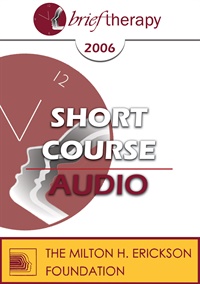
- Average Rating:
- Not yet rated
- Topic Areas:
- Short Courses | Brief Therapy | Hypnosis | Therapist Development
- Categories:
- Brief Therapy Conference | Brief Therapy Conference 2006
- Faculty:
- Rubin Battino, MS
- Duration:
- 1:19:30
- Format:
- Audio Only
- Original Program Date:
- Dec 07, 2006
- Short Description:
- Battino looks at how expectation shapes change in very brief therapy, often within a single session. Participants learn how reframing, metaphor, paradox, and simple experiential tasks can interrupt stuck patterns without extensive history-taking or diagnosis. Drawing from Ericksonian, solution-focused, and hypnotic traditions, the session offers practical, learnable strategies that show how therapist belief, language, and timing can dramatically influence outcomes.
- Price:
- $15.00 - Base Price
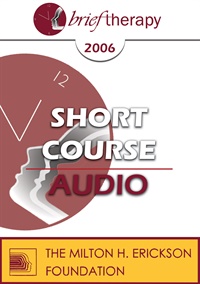
- Average Rating:
- Not yet rated
- Topic Areas:
- Short Courses | Trance | Burnout | Humor | Brief Therapy | Hypnosis
- Categories:
- Brief Therapy Conference | Brief Therapy Conference 2006
- Faculty:
- Betty Blue, PhD
- Duration:
- 1:11:24
- Format:
- Audio Only
- Original Program Date:
- Dec 07, 2006
- Short Description:
- Stress, grief, and burnout can quietly harden into learned helplessness. In this lively and experiential short course, Betty Blue reframes playfulness as a therapeutic antidote, blending Ericksonian trance, metaphor play, neuroscience, humor, and self-disclosure. Through stories, demonstrations, and audience participation, she shows how compassionate, client-centered play can restore balance, awaken resilience, and help both therapists and clients laugh in the face of life’s darkest moments.
- Price:
- $15.00 - Base Price
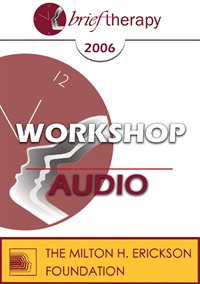
- Average Rating:
- Not yet rated
- Topic Areas:
- Workshops | Cognitive Behavior Therapy (CBT) | Hypnosis
- Categories:
- Brief Therapy Conference | Brief Therapy Conference 2006
- Faculty:
- Michael Yapko, PhD
- Duration:
- 2:39:09
- Format:
- Audio Only
- Original Program Date:
- Dec 10, 2006
- Short Description:
- This session explores how hypnosis enhances cognitive-behavioral therapy by amplifying focus, fostering cognitive flexibility, and reshaping automatic thoughts. Emphasizing experiential learning, the workshop highlights hypnosis as a tool for seeding behavioral activation, building positive expectancy, and helping clients reframe rigid beliefs. Participants gain both a structural model of hypnotic sessions and practical examples of applying hypnosis to depression, anxiety, pain management, and end-of-life care.
- Price:
- $15.00 - Base Price
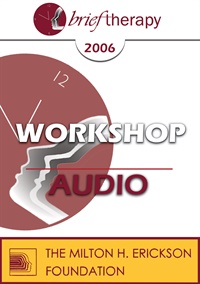
- Average Rating:
- Not yet rated
- Topic Areas:
- Workshops | Brief Therapy | Hypnosis | Psychotherapy
- Categories:
- Brief Therapy Conference | Brief Therapy Conference 2006
- Faculty:
- Stephen Lankton, MSW
- Duration:
- 2:37:19
- Format:
- Audio Only
- Original Program Date:
- Dec 10, 2006
- Short Description:
- Research shows that treatment paired with hypnosis is more effective than treatment alone for many types of problems. The science and art of hypnosis is now widely recognized as a component tool for psychotherapy and has been employed successfully as a comfortable part of private practice and agency practice for years. As hypnosis spreads into the mainstream of psychotherapy, it is important to get competent information regarding its use. Lacking that, many practitioners do not make use of the advantages it provides as an adjunct to a well-rounded set of clinical skills. This workshop is intended to correct that lack of understanding and training in this important area. The rationale, indications and basic use will be explained and demonstrated with practical exercises to help convey the key language skills that are requisite.
- Price:
- $15.00 - Base Price
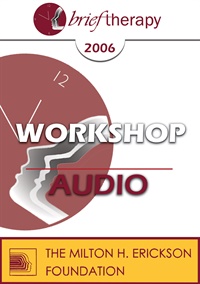
- Average Rating:
- Not yet rated
- Topic Areas:
- Workshops | Hypnosis | Experiential Therapy | Brief Therapy | Homework
- Categories:
- Brief Therapy Conference | Brief Therapy Conference 2006
- Faculty:
- Jeffrey Zeig, PhD
- Duration:
- 1:58:24
- Format:
- Audio Only
- Original Program Date:
- Dec 10, 2006
- Short Description:
- An experiential orientation empowers therapeutic change. Dramatic experiential methods can be used by any clinician in every stage of the therapeutic process including assessment, in session treatment and homework assignments. Techniques to be demonstrated and practiced include therapist sculpting, symbolic assignments and analogical tasks.
- Price:
- $15.00 - Base Price
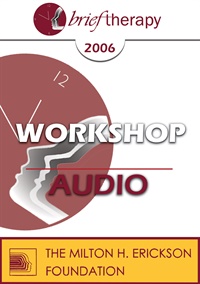
- Average Rating:
- Not yet rated
- Topic Areas:
- Workshops | Hypnosis | Cognitive Behavior Therapy (CBT) | Therapist Development
- Categories:
- Brief Therapy Conference | Brief Therapy Conference 2006
- Faculty:
- Michael Yapko, PhD
- Duration:
- 2:37:17
- Format:
- Audio Only
- Original Program Date:
- Dec 10, 2006
- Short Description:
- This workshop explores the power of expectancy in shaping clinical outcomes and how hypnosis can strengthen it. Participants learn strategies for instilling realistic hope, interrupting negative self-fulfilling prophecies, and fostering future orientation. The session highlights optimism as a therapeutic tool, showing how therapists can help clients believe in change and commit to the process.
- Price:
- $15.00 - Base Price
- Average Rating:
- Not yet rated
- Topic Areas:
- Clinical Demonstrations | Hypnosis
- Categories:
- Brief Therapy Conference | Brief Therapy Conference 2008
- Faculty:
- Michael Yapko, PhD
- Course Levels:
- Master Degree or Higher in Health-Related Field
- Duration:
- 56:41
- Format:
- Audio and Video
- Original Program Date:
- Dec 13, 2008
- Short Description:
- This demonstration explores hypnosis as a context for discovery rather than a set technique. Yapko demonstrates how trance invites new associations, deepens the therapeutic alliance, and supports problem-solving by shifting rigid perspectives. Participants see how hypnosis can transform isolated painful events into opportunities for compassion, resilience, and lasting growth.
- Price:
-
Sale is $29.00
price reduced from Base Price - $59.00
BT08 Clinical Demonstration 07 - Using Hypnosis in a Brief Therapy Demo - Stephen Lankton, MSW, DAHB
- Average Rating:
- Not yet rated
- Topic Areas:
- Clinical Demonstrations | Brief Therapy | Hypnosis
- Categories:
- Brief Therapy Conference | Brief Therapy Conference 2008
- Faculty:
- Stephen Lankton, MSW
- Course Levels:
- Master Degree or Higher in Health-Related Field
- Duration:
- 58:19
- Format:
- Audio and Video
- Original Program Date:
- Dec 13, 2008
- Short Description:
- BT08 Clinical Demonstration 07 - Using Hypnosis in a Brief Therapy Demo - Stephen Lankton, MSW, DAHB
- Price:
-
Sale is $29.00
price reduced from Base Price - $59.00
- Average Rating:
- Not yet rated
- Topic Areas:
- Fundamentals of Hypnosis | Hypnosis | Phenomenology | Hypnotic Induction | Trance | Tailoring
- Categories:
- Brief Therapy Conference | Brief Therapy Conference 2008
- Faculty:
- Jeffrey Zeig, PhD
- Course Levels:
- Master Degree or Higher in Health-Related Field
- Duration:
- 2:23:04
- Format:
- Audio and Video
- Original Program Date:
- Dec 11, 2008
- Short Description:
- Hypnosis is not a thing, but a way that things happen. To make hypnosis happen a clinician needs to understand the underlying architecture of trance. Eliciting systemic components elicits trance. The grammar, context and relational elements of eliciting these components will be explained. We will develop an induction model based on three steps. This workshop will consist of lecture, demonstration and small group practice.
- Price:
- $29.00 - Base Price


